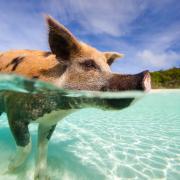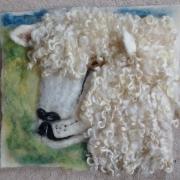Animal magic with the media vet and chef to pets
Can I feed my dog a vegetarian diet? Is it safe to feed my cats on vegan food? These are questions that are becoming increasing common in vet surgeries up and down the country as more and more pet parents consider the impact of their pet’s diet on their health and the planet. As our own diets tend towards less meat and more plants, and we learn more about the health and climate benefits of these lower meat diets, it’s understandable that we’re also starting to seriously question the need to feed our pets on diets packed full of meat. But just how safe and healthy are meat-free diets for our pets – and are they actually that much better for the planet?
If you ask many vets, the answer to the first question will be an unequivocal no – the official position of the profession, including guidance from the British Veterinary Association, is that dogs and cats need to be fed on a meaty diet. However, recent scientific studies are increasingly bringing this position into question; a trial carried out by the University of Winchester’s Centre for Animal Welfare surveyed more than 2,500 dog owners divided into those feeding a conventional commercial diet, those feeding a high-meat raw diet, and owners feeding a completely vegan diet to their dogs. Once the age of the dogs was corrected for (those being fed a raw diet were younger than the other groups on average), the results showed that those dogs fed a vegan diet had the best indicators of long-term health.
READ MORE: Choosing the right breed of dog.
It’s not just dogs that are able to thrive on a no-meat diet – even cats, who are known as obligate carnivores because of their requirement for specific nutrients from meat such as taurine and arachidonic acid, seem to do well on well-designed vegan diets fortified with these nutrients. A study carried out by the University of Guelph in Canada last year found that cats fed a vegan diet had lower instances of gastrointestinal disorders (such as diarrhoea and vomiting), better body condition, and a higher score on owner-reported health measures.
These studies do need to be tempered with some caution, particularly where cats are concerned, as it is vital that any meat-free diet is carefully formulated to ensure it provides all of the essential nutrients the animals need – but this is also true of more traditional meaty diets which have been shown to contain variable levels of nutrients, so it is not just an issue related to meat-free diets.
If we are moving towards an acceptance that vegetarian and vegan diets can work for pets, and can be just as healthy for them, what about the second question – are they actually that much better for the planet than meat-based diets? The answer here seems to be a clear ‘yes’; it has been shown that far from just using up abattoir waste meat, around a third of all meat going into pet food in the UK comes directly from the human food chain, and therefore carries with it a very significant environmental cost in terms of CO2 emissions and water usage.
So, it seems we should be moving towards feeding our pets less meat-intensive diets. There will be many people out there for whom this will be a difficult transition to consider, but I am hopeful that more dogs and cats will be thriving on less meat in future years.
Follow Joe on Twitter: @joethevet



























